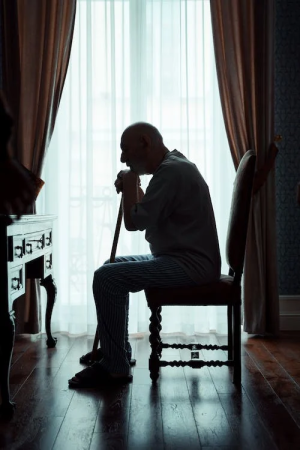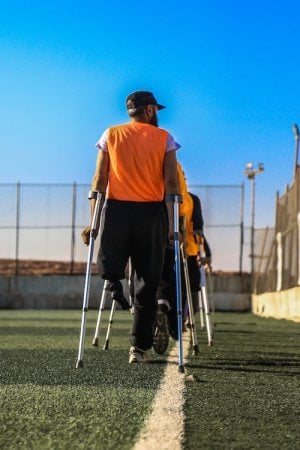Plan to reduce pension access for claimants with drug and alcohol-related conditions is scrapped
- Replies 79
The Albanese government has put an end to a disability support pension (DSP) proposal that would have made it more difficult for claimants with drug and alcohol-related illnesses to access pensions.
A spokesperson for the Department of Social Services confirmed the development as part of the budget process.
‘The reversal of this measure is a clean slate on this issue, as the department continues its review of the disability support pension impairment tables,’ they said.
A similar move gained ground in 2018 under the former Coalition government, but it was rejected by the Senate.
But despite this plan being scrapped, the Albanese government is still being pressured to act on problems with the structure of the DSP.
In 2021, a Senate inquiry found ‘serious flaws’ with the disability support pension system, which led to recommendations of improvements such as allowing applicants to qualify for DSP with an accumulated 20 points and not 20 points under one assessment table.
For an applicant to qualify, they must satisfy strict requirements such as obtaining a 20-point ‘severe’ rating under one table.

The government uses various tables to assess applicants for DSP, which covers many bodily functions such as brain function, digestive and reproductive function, and limb function.
The inquiry, led by Greens senator Janet Rice (we’ve included a useful video at the end of the article), also pushed for the review of a rule requiring a condition to be ‘fully diagnosed, treated, and stabilised’ over concerns it holds back many people with systemic access issues from getting aid.
Now, the Albanese government has proposed new impairment tables as part of once-a-decade reviews on rules governing disability pension eligibility.
‘The proposed changes to the Impairment Tables are to improve consistency, address advancements in medical technology and terminology, provide clearer guidance and improve accessibility.’ the Department of Social Services said.
‘The changes aim to ensure there is better clarity around eligibility for the Disability Support Pension.’
Other key changes are requirements for health conditions to just be ‘diagnosed, reasonably treated, and stabilised’ to qualify for DSP.
Persons with conditions like cancer are also expected to have easier access to DSP, while those with mental health conditions must first obtain evidence from registered psychologists.

But the new tables have received mixed reactions, with some concerned they are still preventing many people in need of financial aid from accessing disability aid.
For one, Rice claimed the changes were ‘a few minor tweaks’ that ignored her Senate panel’s findings in 2021.
One key criticism from her was that the rule on illnesses being ‘diagnosed, reasonably treated, and stabilised’ should have been scrapped outright as it still presented a hurdle for those with disabilities.
This is an opinion shared by Kristin O’Connor, a DSP recipient and spokesperson of the Antipoverty Centre.
‘If it’s functionally impairing you, why should you need to have those criteria fulfilled?’ she asked.
Others also saw the need for improvement despite the welcome changes.
‘Too often the word “unable” appears in the suggested reforms, rather than “experiences severe difficulty in performing”,’ said Ian Turton of the Illawarra Legal Centre.
‘These are meant to assess their ability to work. In the workplace, the issue isn’t the ability to do something once off and then rest. It’s “can this person sustain tasks like this in a work-based environment?”’
‘Some of the tables are still an “all or nothing” test. I’ve seen Centrelink lawyers say, “This client picked up a pen, which means they can lean forward and pick up a light object”, which is one of the tests in the tables. There are too many gotcha moments in the changes.’
Australian Council of Social Service Chief Executive Cassandra Goldie meanwhile found a few things to celebrate in the revised impairment tables, such as improved recognition of disabilities and conditions, including neurodiversity.
‘Ultimately, however, amendments to the impairment tables can only go so far,’ she said.
‘The real issues with access to DSP will still need to be addressed.’

DSP varies on a case-to-case basis, but the maximum basic rate for a single person aged 21 and above without a child per fortnight is currently $936.80.
Figures from the Department of Social Services earlier revealed that around 358,000 Australians, about 43.1%, on JobSeeker payment only had a ‘partial capacity to work’ for 15-30 hours weekly.
These people included those with various ailments, including cancer, musculoskeletal or connective tissue diseases, and mental health conditions.
What is your reaction to this story? What other changes do you think could be done so more people with disabilities can access the disability support pension?
Tell us your thoughts and opinions below!
Source: YouTube/Australian Greens
A spokesperson for the Department of Social Services confirmed the development as part of the budget process.
‘The reversal of this measure is a clean slate on this issue, as the department continues its review of the disability support pension impairment tables,’ they said.
A similar move gained ground in 2018 under the former Coalition government, but it was rejected by the Senate.
But despite this plan being scrapped, the Albanese government is still being pressured to act on problems with the structure of the DSP.
In 2021, a Senate inquiry found ‘serious flaws’ with the disability support pension system, which led to recommendations of improvements such as allowing applicants to qualify for DSP with an accumulated 20 points and not 20 points under one assessment table.
For an applicant to qualify, they must satisfy strict requirements such as obtaining a 20-point ‘severe’ rating under one table.

The government has backed down on a proposal that would have endangered the access of those with drug and alcohol-related issues from disability support. Stock Image Credit: Pexels/Cottonbro Studio
The government uses various tables to assess applicants for DSP, which covers many bodily functions such as brain function, digestive and reproductive function, and limb function.
The inquiry, led by Greens senator Janet Rice (we’ve included a useful video at the end of the article), also pushed for the review of a rule requiring a condition to be ‘fully diagnosed, treated, and stabilised’ over concerns it holds back many people with systemic access issues from getting aid.
Now, the Albanese government has proposed new impairment tables as part of once-a-decade reviews on rules governing disability pension eligibility.
‘The proposed changes to the Impairment Tables are to improve consistency, address advancements in medical technology and terminology, provide clearer guidance and improve accessibility.’ the Department of Social Services said.
‘The changes aim to ensure there is better clarity around eligibility for the Disability Support Pension.’
Other key changes are requirements for health conditions to just be ‘diagnosed, reasonably treated, and stabilised’ to qualify for DSP.
Persons with conditions like cancer are also expected to have easier access to DSP, while those with mental health conditions must first obtain evidence from registered psychologists.

A 2021 Senate review found many points for improvement in Australia’s disability guidelines. Stock Image Credit: Pexels/Anas Aldyab
But the new tables have received mixed reactions, with some concerned they are still preventing many people in need of financial aid from accessing disability aid.
For one, Rice claimed the changes were ‘a few minor tweaks’ that ignored her Senate panel’s findings in 2021.
One key criticism from her was that the rule on illnesses being ‘diagnosed, reasonably treated, and stabilised’ should have been scrapped outright as it still presented a hurdle for those with disabilities.
This is an opinion shared by Kristin O’Connor, a DSP recipient and spokesperson of the Antipoverty Centre.
‘If it’s functionally impairing you, why should you need to have those criteria fulfilled?’ she asked.
Others also saw the need for improvement despite the welcome changes.
‘Too often the word “unable” appears in the suggested reforms, rather than “experiences severe difficulty in performing”,’ said Ian Turton of the Illawarra Legal Centre.
‘These are meant to assess their ability to work. In the workplace, the issue isn’t the ability to do something once off and then rest. It’s “can this person sustain tasks like this in a work-based environment?”’
‘Some of the tables are still an “all or nothing” test. I’ve seen Centrelink lawyers say, “This client picked up a pen, which means they can lean forward and pick up a light object”, which is one of the tests in the tables. There are too many gotcha moments in the changes.’
Australian Council of Social Service Chief Executive Cassandra Goldie meanwhile found a few things to celebrate in the revised impairment tables, such as improved recognition of disabilities and conditions, including neurodiversity.
‘Ultimately, however, amendments to the impairment tables can only go so far,’ she said.
‘The real issues with access to DSP will still need to be addressed.’
Key Takeaways
- The Albanese government has backed down from a proposal that would have made it harder for people with drug and alcohol-related conditions to get access to the disability support pension.
- Advocates have had mixed reactions to the proposed revisions, which have been criticised by welfare groups for blocking many people from government support.
- But advocates say the language in some of the new impairment tables would be problematic for some applicants.
DSP varies on a case-to-case basis, but the maximum basic rate for a single person aged 21 and above without a child per fortnight is currently $936.80.
Figures from the Department of Social Services earlier revealed that around 358,000 Australians, about 43.1%, on JobSeeker payment only had a ‘partial capacity to work’ for 15-30 hours weekly.
These people included those with various ailments, including cancer, musculoskeletal or connective tissue diseases, and mental health conditions.
What is your reaction to this story? What other changes do you think could be done so more people with disabilities can access the disability support pension?
Tell us your thoughts and opinions below!
Source: YouTube/Australian Greens







